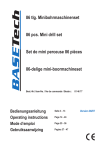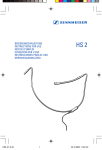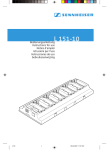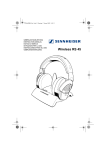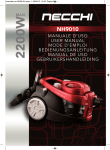Download Sennheiser RS 65 Instruction manual
Transcript
GEBRAUCHSANLEITUNG INSTRUCTION MANUAL NOTICE D´EMPLOI ISTRUZIONI PER L´USO INSTRUCIONES PARA EL USO GEBRUIKSAANWIJZING Wireless RS 65 INHALT UND ANSCHLÜSSE / SYSTEM COMPONENTS AND CONNECTIONS / ELEMENTS DU SYSTEME ET RACCORDEMENT / INDICE E COLLEGAMENTO / CONTENIDO Y CONEXIONES / INHOUD EN AANSLUITING (925 MHz) Gebrauchsanleitung Instruction manual Notice d´emploi Istruzioni per l´uso Instruciones para el uso Gebruiksaanwijzing 3 7 11 15 19 23 Wireless RS 65 Thank you for choosing Sennheiser! Over half a century of accumulated expertise in the design and manufacture of high-quality electro-acoustic equipment have made Sennheiser a world-leading company in this field. We have designed this product to give you reliable operation over many years. Please take a few moments to read these instructions carefully, as we want you to enjoy your new Sennheiser product quickly and to the full. English System components and connections Before proceeding, please check and make sure the system components shown are all present and correct (see illustration inside cover page). Establish the necessary connections. Charge the accupack for 24 hours before you use it for the first time! (Please refer to the section Charging the accupack.) Where to place the transmitter Choose a suitable place near your hi-fi system or TV set. Do not place the transmitter close to metal objects such as shelf bars, reinforced concrete walls, etc. The transmitter features a convenient automatic on/off function. The transmitter is switched on by the audio signal. If there is no audio signal for about 3 minutes, the transmitter automatically switches off. The transmitter is now in stand-by mode, its power consumption is very low so that it can remain connected to the mains. Accupacks can always be recharged when the transmitter is connected to the mains. Switching the headphone receiver on The ON/OFF switch is on the right earpiece. Switching the headphone receiver off Make sure to switch off the headphones after each use and store the headphones in the transmitter’s charging compartment to avoid discharging the accupack. Wireless RS 65-7 Adjusting the volume Set the volume of your sound source to a medium value. With some devices, the volume for the headphone output can be regulated separately. English Use the VOLUME control on the right earpiece to adjust the headphones´ volume. Adjusting the receiver channel First switch on the transmitter (see section Where to place the transmitter). Then switch on the headphone receiver - as soon as the receiver is switched on it automatically tunes itself to the first strong signal found (normally the transmitter frequency). If, for some reason, the selected channel is not the correct one (eg: because of interference or another nearby system), press the TUNE button on the earpiece and the auto-tune function will re-tune to the next strong signal. Repeat this until you can hear the audio signal loud and clear. If you decide to change the transmitter channel, the receiver search tuning must be re-started by pressing the TUNE button on the headphones again Changing the transmission channel To avoid interference caused by the simultaneous operation of several transmitters, select a different channel on each transmitter. Depending on the system variant, two or three switchable transmission channels are available. To select a channel, press the CHANNEL button until the desired LED or LED combination lights up: LED 1 channel 1 active LED 2 channel 2 active LED 1 and 2 channel 3 active (except 863 MHz version). Complete freedom of movement It is not necessary that transmitter and headphone receiver are in a direct line of sight, so you can move around freely in the home or outside in the garden. One transmitter can be used to transmit to several receivers on the same frequency. Additional headphones with the designation HDR 65 are available from your specialist dealer. Please make sure to choose headphones with the same frequency range as the transmitter you are using (see type plate on the bottom of the transmitter). Wireless RS 65-8 Always store the headphones on the transmitter to ensure that they are fully charged when they are needed. The headphones are automatically switched off by the charging process. BA 151 spare accupack When the headphones’ accupack is going flat (noise, interference and distortion are sure signs of a flat accupack), recharge the accupack. After an initial charging of 24 hours, the normal charging time is 14 hours. A fully charged accupack has an operating time of more than four hours. Place the discharged accupack in the charging compartment at the back of the transmitter and use the spare accupack in the meantime. Additional BA 151 spare accupacks can be charged via the L 151-2 charger (available from your specialist dealer). is a trademark of SRS Labs, Inc. Before disposing of an old and exhausted accupack, make sure that it is totally discharged by using it until the device switches off. To protect the environment, only dispose of totally exhausted accupacks. Sound Retrieval System (SRS) This device is equipped with SRS, a system that creates a full bodied three dimensional sound image from a stereo signal. You can switch SRS ON and OFF by pressing the SURROUND button on the transmitter. Additional information The audio transmission technology used with this device is basically that of a radio. According to today’s scientific knowledge, the radio waves emitted by this device are not harmful to humans or animals. ATTENTION: LISTENING AT HIGH VOLUME LEVELS FOR LONG PERIODS CAN PERMANENTLY DAMAGE YOUR HEARING. This device has been designed for use with stereo devices. For connection to mono devices, please use a stereo to mono jack plug available from most audio accessory shops. Use a soft cloth or, if necessary, a damp wash-leather for cleaning the devices. Do not use aggressive cleansing agents. Wireless RS 65-9 English Charging the accupack For charging the accupack, place the headphones into the transmitter’s charging compartment (nb: make sure the headphones are inserted the correct way round. The Sennheiser logo on the headband must be readable looking from the front - see diagram. The charging contacts are on the RH earpiece of the headphones - these are placed on the corresponding contacts in the LH indentation of the transmitter, the one next to the “charge” light). The red LED on the transmitter must light up to show charging is taking place. English Varnish or furniture polish may attack the rubber feet of the transmitter’s charging unit. As these could stain your furniture, place the transmitter on a non-slip pad. If problems occur... Are all connections properly made? Are the headphones and sound source switched on and is the volume correctly adjusted? Have you charged the accupack for at least 20 minutes? Are you too far from the transmitter? (if so, move closer) Choose a different channel. Adjust the setting with the TUNE button. If the problem persists, please contact your specialist dealer for assistance. Never open the device! Only use original Sennheiser spare parts and accessories. Components from other manufacturers (e.g. for mains unit or accupack) may cause damage to the device and will invalidate the guarantee. Accessories The following accessories are available from your specialist dealer: Spare accupack BA 151 Charger L 151-2 Additional headphones HDR 65 Technical data Modulation Transmitter Power supply Power consumption RF output power Signal-to-noise ratio Frequency range Channels Audio connector Charging compartments Weight Dimensions Receiver Max. sound pressure level THD Power supply Current consumption Operating time Weight Dimensions Wireless RS 65-10 FM, stereo 12 V DC via plug-in mains unit approx. 1 VA typ. up to 10 mW (0.75 mW with 925 MHz version) typ. > 68 dBA see type plate located on the bottom of transmitter 3 (2 with 863 MHz version) 3.5 mm /1/4" (6.3 mm) stereo jack plug, (925 MHz version supplied with jack to 2 x phono plug) 1, for BA 151 accupack approx. 186 g incl. accupack approx. 155 x 153 x 105 mm 100 dB < 0.5 % (at 1 kHz and nom. deviation) 2.4 V via BA 151 accupack approx. 19.5 mA more than 4 hrs per accupack approx. 160 g incl. accupack approx. 150 x 80 x 200 mm Zulassung Dieses Gerät ist wie folgt zugelassen und erfüllt die anwendbaren CE Normen und Vorschriften. Type Approval This device has been type-approved to EN 300 220-1 Nov.97 and is in compliance with the applicable CE standards and regulations. Certification Ces casques sont en conformité avec les normes CE et ont les certifications suivantes. Certificazione Questo apparecchio è certificato come qui di seguito e si attiene alle normative e alle prescrizioni CE applicabili. Autorizacion Este aparato está autorizado de la forma a continuación indicada y cumple las normas y directrices de la CE aplicables. Vergunning Dit toestel is zoals volgt beschreven toegelaten en voldoet de toepasselijke CEnormen en voorschriften. R&TTE-Anforderungen Wenn Sie dieses Produkt innerhalb des EG-Raums, aber außerhalb des Landes verwenden, in dem Sie das Produkt erworben haben, machen Sie sich bitte unbedingt mit den Zulassungsbedingungen des entsprechenden Landes vertraut. Zusätzlich sollten Sie sich informieren, ob das Gerät in dem jeweiligen Land von der Zulassungsstelle genehmigt werden muß. R&TTE Requirements When using this product within the European Union, but outside the country of purchase, you must inform yourself about the type approval regulations in the country of use. You must also check whether or not the product needs to be licensed by the national approval authorities. Radio regulations vary from country to country and what is legal in the country of purchase is not necessarily legal in another EU country. Requisitos R&TTE En employant ce produit au sein de l'Union européenne, mais en dehors du pays d'achat, vous devez vous informer des clauses particulières de réglementation applicables dans le pays d'utilisation. Vous devez aussi vérifier si le produit doit ou non être soumis à une licence d'utilisation par l'autorité nationale compétente. En matière de radio, les règlements varient d'un pays à l'autre. Ce qui est légal dans le pays d'achat n'est pas nécessairement légal dans un autre pays de l'UE. Omologazione R&TTE Se utilizzate questo prodotto in ambito CE, ma in un paese diverso da quello dove l'avete acquistato, è necessario conoscere le norme d'omologazione vigenti in quel paese. Consigliamo anche di informarsi se l'uso dell'apparecchio richiede un permesso specifico rilasciato dagli uffici competenti. Exigencias R&TTE Si va Ud. a emplear este producto dentro del ámbito de la CE, pero fuera del país en que lo ha adquirido, es indispensable conocer los requisitos de aprobación existentes en el respectivo país. Además, deberá Ud. averiguar si en el país respectivo se precisa la autorización del aparato, concedida por un organismo de autorización. R&TTE Eisen Als u dit produkt binnen de EU-ruimte wilt benutten, maar buiten het land wilt gebruiken waarin u het produkt gekocht heeft, adviseren wij dat u zich zeer beslist met de toelatingseisen van het betreffende land vertrouwd maakt. Informeer uzelf bovendien, of u voor het toestel in het betreffende land een vergunning van het bureau voor de afgifte van vergunningen benodigd. Garantie / Warranty / Garantie / Garanzia / Garantia / Garantie 2 Jahre Garantie 2-year warranty 2 ans de garantie 2 anni di garanzia 2 años de garantía 2 jaar garantie Headphone and the Symbol are trademarks of SRS Labs, Inc. in the United States and selected foreign countries. Headphone technology is incorporated under license from SRS Labs, Inc. Änderungen vorbehalten Subject to alterations Sous réserve de modification Con riserva die modifiche Reservado el derecho a introducir modificaciones Wijzigingen voorbehouden Sennheiser electronic GmbH & Co. KG D-30900 Wedemark Printed in Germany Publ. 01/01 Telefon +49 (0) 5130/600-0 Telefax +49 (0) 5130/600-300 www.sennheiser.com 81855 / A02












